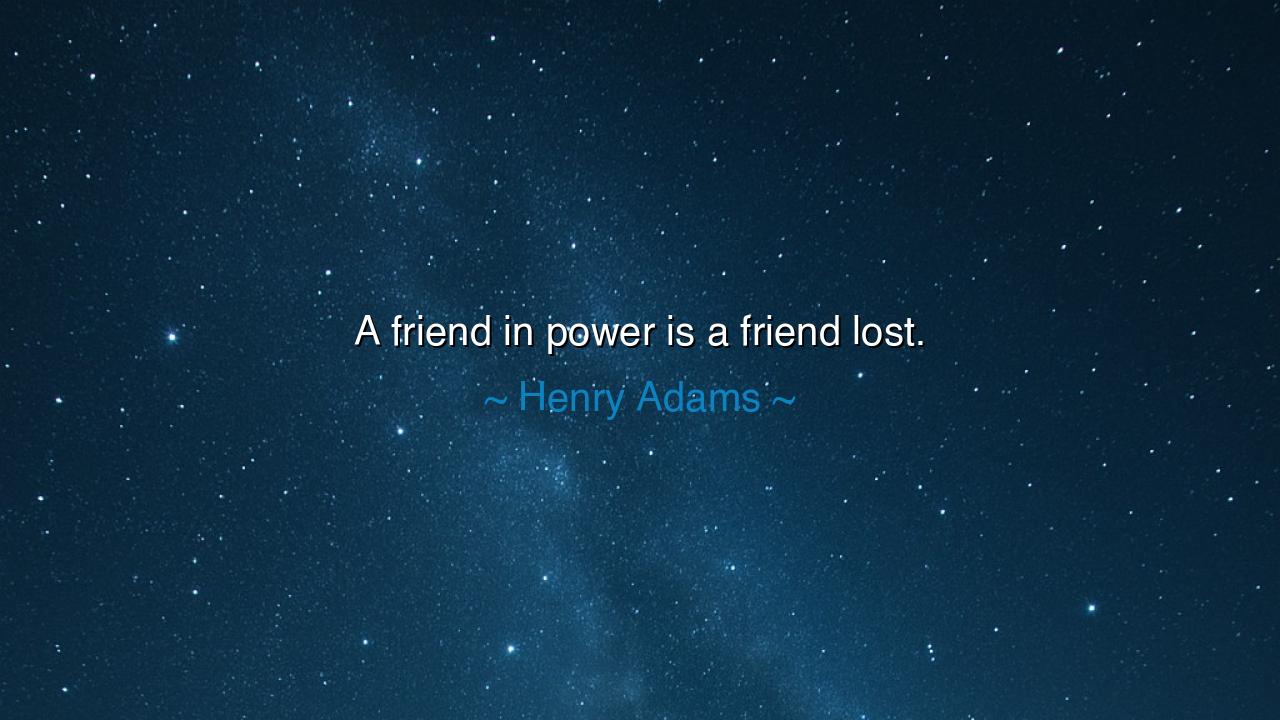
A friend in power is a friend lost.






“A friend in power is a friend lost.” Thus spoke Henry Adams, the historian and philosopher of a changing age, who gazed upon the machinery of politics and saw in it the corrosion of the human heart. His words are as sharp as a blade honed by sorrow and experience — the lament of a man who had watched friendship fall beneath the shadow of power. In this brief sentence lies a truth both ancient and eternal: that power, when it enters the heart of a man, rarely leaves room for the gentle warmth of loyalty. It divides where once there was union, it commands where once there was trust. To gain power is to walk a road where few friends may follow — for the throne, whether gilded or invisible, changes all who sit upon it.
Adams, born into one of the most distinguished families in American history — grandson and great-grandson of presidents — understood better than most how power transforms friendship. He moved among the mighty, yet felt always its chill distance. His words were not those of bitterness, but of observation. He had seen men rise from humble fellowship into high office, and as they climbed, the air between them grew thin. The laughter of equality turned into the silence of hierarchy. For when one friend ascends to power, the other must stand below; and between them, invisible yet impassable, falls the barrier of authority.
To understand his wisdom, we must look beyond politics and into the soul itself. Power, by its nature, demands allegiance, not intimacy. It calls for obedience, not honesty. It thrives on appearances, on distance, on the careful play of strength and caution. Friendship, by contrast, breathes in openness and equality — it flourishes only where hearts meet without fear. Thus, when one friend becomes powerful, the ground beneath the friendship shifts. The old ease gives way to unease; the jest becomes dangerous; the counsel once freely given now risks offense. And so, little by little, friendship fades — not always through betrayal, but through the quiet erosion that power brings.
History, rich with the dust of empires, bears countless witnesses to this truth. Consider the tale of Julius Caesar and Brutus. Once companions bound by trust, they stood side by side in ambition and honor. But when Caesar rose to supreme power, the friendship could not endure. The man who had been friend became ruler; and the man who had been brother-in-arms became subject. In that imbalance, affection turned to suspicion, and loyalty to fear. The final act of that tragedy — the blade in Caesar’s heart and the whisper, “Et tu, Brute?” — was not born of hatred alone, but of the ruin that power brings to friendship. For in that moment, both men were lost — Caesar to death, and Brutus to guilt.
And yet, my child, Adams’s warning is not meant only for kings and conquerors. In every age, in every life, the same danger lurks. When success raises one above the other — when wealth, fame, or position creates distance — the heart must guard itself lest friendship perish. The one who gains power must remember humility, and the one who remains below must resist envy. Friendship can survive even power’s shadow, but only if both souls refuse to let pride take root. Humility is the bridge that power cannot burn, and loyalty the compass that can still point toward love.
There are, too, rare and shining examples of friendships that endure despite the gulf of authority. Consider Abraham Lincoln and his law partner, William Herndon. When Lincoln rose from the modest offices of Illinois to the presidency of a divided nation, he never ceased to value his friend’s counsel. Herndon, though left behind in the humbler practice, spoke of Lincoln not with bitterness but with respect, for Lincoln’s power had not hardened him. He remembered his roots, his laughter, his shared labor. In this, he proved Adams’s lament not inevitable but conditional — that power need not destroy friendship if the heart remains steadfast and humble.
Therefore, my child, learn this: power is a test of character, and friendship is its proving ground. If fortune ever raises you above those you love, let gratitude anchor you to them. Do not let the crown weigh heavier than the bond. Invite counsel instead of praise, remembrance instead of flattery. And if your friend should rise above you, do not shrink in jealousy, but honor their ascent — for the friendship that endures difference is the truest of all.
In the end, Henry Adams’s words remind us of a truth both tragic and redemptive: that friendship and power walk uneasy paths together, yet one may still guide the other if wisdom leads. A friend in power is often a friend lost, yes — but it need not be so if the soul remains pure. Guard your friendships with humility, for they are rarer than glory and more enduring than fame. For when all titles fade and all thrones crumble, it is not power that will remember you — it is the friend whose hand you did not let go.






AAdministratorAdministrator
Welcome, honored guests. Please leave a comment, we will respond soon